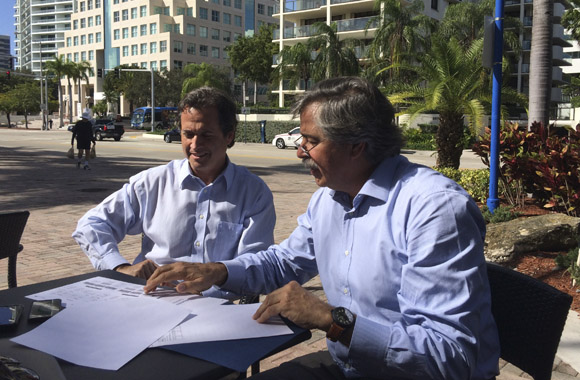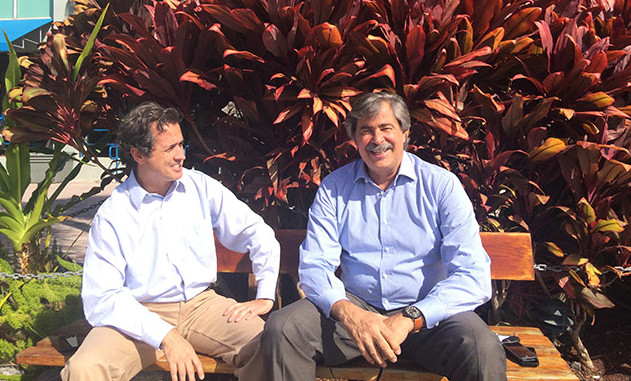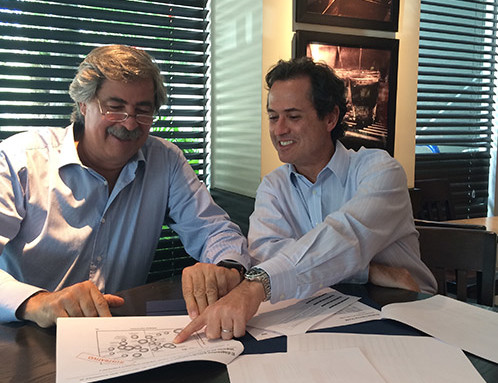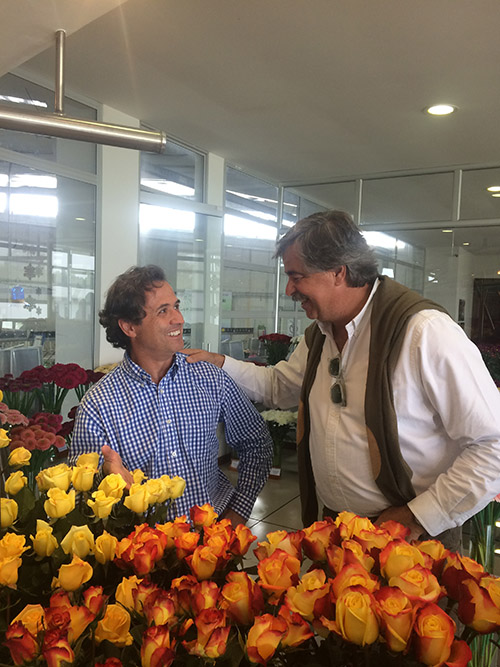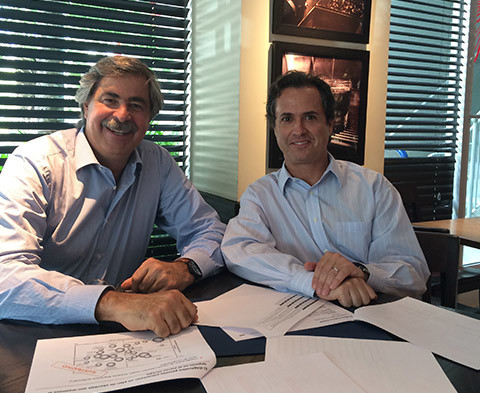- In this edition, Pablo Canales, Executive Director of LAN CARGO Colombia, interviews Chistian Lüchau, Regional Perishables Manager for Central and South America at Kuehne + Nagel, about the challenges the industry faces in the region, the companies’ commercial relationship as strategic partners and projections for 2015.
With over 30 years of experience including a stint in the financial industry, business administrator Christian Lüchau took over as Regional Perishables Manager for Central and South America at Kuehne + Nagel in 2011.
Kuehne + Nagel is one of LAN CARGO’s key customers and, within northern South America, the most important shipper of flowers. The two companies share a long commercial relationship that has strengthened over time.
Pablo Canales (PC): This past year did not fulfill the cargo industry’s expectations. What is your assessment of 2014?
Christian Lüchau (CL): It was a complicated year. We are witnessing a reduction in the transportation of cargo at a global level, which impacted cargo companies more intensely in 2014. Like aeronautics expert Claudia Velásquez told El Portafolio (a Colombian newspaper) several months ago, air cargo is highly connected to external economic variables, and has been forthe last four years declining greatly at a global level, which has undoubtedly affected the industry. If you compare the first five months of the year with 2013, freight volumes were down by 2,300 tons at a global level.
Colombia in particular was a special situation. Although the international market decreased by 3.6% in 2014 — around 8,600 tons — the domestic Colombian market grew by 10.9% — or close to 6,300 tons.
In Latin America the Brazilian market is very influential, since this market moves the most cargo in all of the region. Nevertheless, experts forecast an improvement in the Brazilian economy in 2015, which will have a direct impact on the cargo business in the continent.
PC: You have been in the business for several years, particularly in the perishable goods segment. Based your years of experience, what would you say have been the main changes in the air transportation of perishables in the last few years?
CL: We have seen significant technological changes. This is reflected in, among other things, in communication, document issuance, handling of reservations and electronic transmissions, which has resulted in a faster and more dynamic business.
PC: A faster and more dynamic business… Could you provide a concrete example?
CL: The development of technology has allowed us to significantly reduce response times to our customers regarding the status of their cargo. This thanks to the tracking information provided by airlines, which allows us to considerably reduce our response times in order to solve potential problems.
Technology has also helped us to create a stronger bond with our customers and to communicate with them at the precise time to offer effective solutions.
PC: Leaving the industry as a whole aside for a while and concentrating specifically on your business, how was 2014 for Kuehne + Nagel?
CL: In general, this was a good year for Kuehne + Nagel. The joint work we have carried out with LAN CARGO has allowed us to significantly grow in the perishables sector in Colombia, where we almost doubled cargo volumes compared to 2013.
PC: That is very good news, considering the industry’s context and the different issues we just discussed. In essence, next year has already arrived and we all hope that this new year brings better results. What expectations and challenges will you be facing at Kuehne + Nagel at a regional level in 2015?
CL: Kuehne + Nagel is the regional leader in terms of perishable exports and our projections and challenges will involve gaining ground in the countries in which we aren’t yet market leaders.
Although regional imports are expected to continue to drop due to currency devaluations, and we now that this will lead to challenges for perishables exporters as northbound air freight rates increase and/or capacity decreases, at Kuehne + Nagel we aim to keep our current business and achieve growth at a regional level, strengthening our company’s position in all Latin American countries.
The development of perishables air exports from Latin America is considerable and the continent is set to become a key player in the flower, fruit, fish, aromatic herbs and vegetables markets. In this sense, we aim to boost business in these sectors and to cover all of the countries in Central and South America. To this end, we are taking advantage of a network of more than 1,000 offices in more than 100 countries.
PC: With this goal in mind, what projects of interest do you have in the short and long term for the perishables business?
CL: We have been working on the development of new applications to improve our service and on the implementation of the KNFresh system throughout the region.
PC: It sounds very interesting. Could you explain what KNFresh is?
CL: KNFresh is the software we use to control and execute the perishables cargo process. It covers every step of the process — from online reservations made by exporters, to production of documents for shipments, to tracking cargo and providing updates to customers.
PC: It’s a very useful tool! In particular for tracking cargo, which is one of our customers’ main concerns — especially those who ship perishable products. When you refer to new applications to improve your service, what are they and how can they improve your service?
CL: At Kuehne + Nagel, we have a Research & Development department. R&D allows us to be at the cutting edge in terms of technology by creating innovative tools to improve our processes. We therefore maximize our service to customers by delivering precise and accurate information in real time, using phone and data reception apps specialized for the business.
All of these tools help us to improve the service that we provide to our customers.
PC: Flowers are one of the most important products for your company in the region. What does Kuehne + Nagel expect for this market in the year that is about to begin?
CL: As a consequence of global dynamics and fluctuations in currency markets, we can expect to see a slowdown in flower exports from Colombia and Ecuador towards the markets most affected by currency devaluations. Countries like Russia, Japan and Australia, among others, have experienced significant devaluations and, as a consequence, exporters will likely seek to increase their exports towards the United States and Canada.
PC: Moving on to business and the working relationship between our companies, how would you assess the relation between LAN CARGO and Kuehne + Nagel? What will be LAN CARGO’s role within Kuehne + Nagel’s regional strategy in 2015?
CL: LAN CARGO is and will continue to be one of our preferred airlines. We have had a considerable increase in volume of business, which suggests that LAN CARGO has achieved its goals in terms of quality and service.
Moreover, LAN CARGO is our strategic partner in the perishables business and we want to take advantage of its presence in Central and South American countries to meet the challenges that we have set for ourselves in 2015.
PC: It is a powerful alliance and both parties want it to be successful. In this sense, what can LAN CARGO do to contribute to Kuenhe + Nagel’s projects in 2015?
CL: LAN CARGO is well-aware of its role, its importance to the business and to the shipment of all types of cargo. In the case of perishables, the company knows that it is crucial to maintain the cold chain during transportation and that special conditions need expert handling so that the dedication and the quality of the producers is reflected at destination.
Flowers’ life cycles are critical for their display, which means that we must be very strict with itineraries in order to maintain quality and avoid surcharges in the transportation chain.
PC: Changing the subject, why should one visit Colombia?
CL: One should visit Colombia for several reasons — its ethnic, cultural and geographic diversity among them. But the main reason to visit, at least in my opinion, is the quality of its people. We are a country of laughter, friendliness and charm and we have been ranked as one of the happiest countries in the world.
PC: Which places do you recommend visiting in the country?
CL: It depends a lot on the visitors’ interests. If they want eco-tourism, we have the Amazon jungle, the Eastern Plains, the Macarena National Park, the coffee region and many other places that are worth travelling to. If they want adventure, they can enjoy a weekend at San Gil, visit Guajira or hike to Santa Marta’s lost city. If they want some folklore and to mix with the locals, they can go to Barranquilla’s carnival, Medellín’s Flower Festival, the San Juan and San Pedro en Huila Festivals, the Blacks and Whites Carnival in Neiva or the Festival of the Vallenato Legend in Valledupar. They can also enjoy wonderful landscapes, including the River of Seven Colors in Caño Cristales, or they can bid the year farewell while dancing at the famous Cali Fair.
PC: For a three-day trip to Bogotá, what are the best places to visit for tourism, gastronomy or to dance some salsa?
CL: Without a doubt, come discover our treasures at the Museum of Gold, take in the paintings of Colombia’s greatest artist at the Botero Museum and enjoy the view from Monserrate, 3,000 metres above sea level. You can eat at one of our traditional restaurants — including Pajares, La Braserie or Criterión — and if there’s time for rumba, Bogotá’s best ambience is at Andrés Carne de Res.
PC: Thank you very much Christian for this very interesting conversation and useful tips. We hope that Kuehne + Nagel has a very good 2015 and that it continues to grow alongside LAN CARGO.
